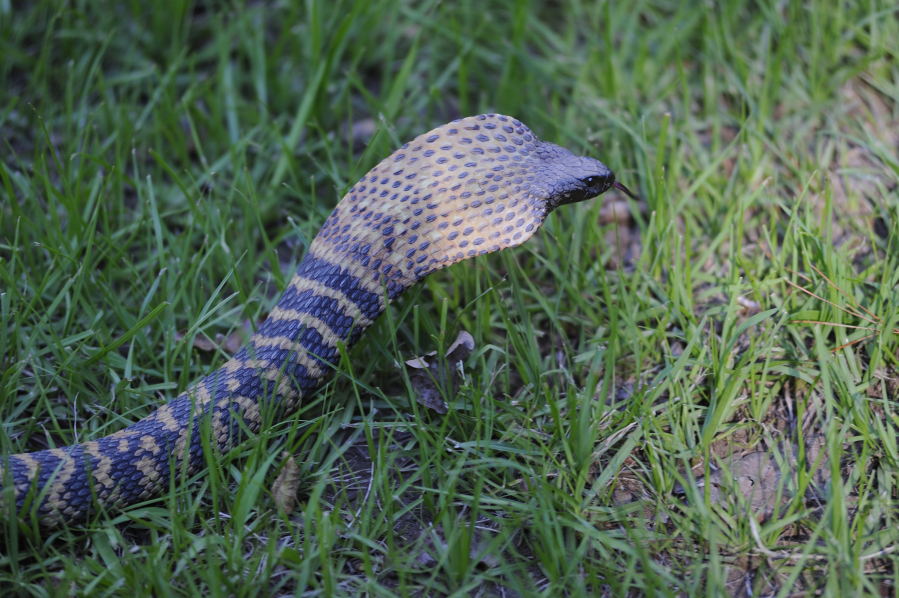FORT LAUDERDALE, Fla. — After a two-year investigation into Florida’s black market trade of dangerous, venomous snakes, eight men are facing charges for their alleged participation in the deals.
Florida Fish and Wildlife Conservation Commission’s Division of Law Enforcement announced the charges Friday, the first wave of arrests under what has been dubbed “Operation Viper.”
Undercover FWC officers purchased or sold almost 200 snakes of 24 different species, FWC said in a statement, including spitting and forest cobras, saw-scaled, rhinoceros, African bush, eyelash, puff adder and Gaboon vipers. Some are “among the most dangerous in the world,” the statement said.
Not only were officers facing “nefarious actors” in dealing with the suspects, they were facing their potentially deadly products, too, FWC DLE Investigations and Intelligence Section Leader Major Randy Bowlin said in a video statement Friday.
“These snakes came from all over the globe. They came from Australia, Asia, Africa, Central and South America, many of them causing deaths …” Bowlin said in the video.
Among those facing charges are four South Florida men — Dylan Isaac Levin, 30, of Palm Beach Gardens; Edward Daniel Bays, 25, of Southwest Ranches; Jorge Javier Gonzalez, 23, of Miami; and Joseph David Switalski Jr., 37, of Plantation. Some of the men investigated are accused of violating laws in several counties.
FWC began investigating in 2020 after learning of the state’s black market for buying and selling the reptiles.
“The illegal sale, purchase, transport and caging of these regulated animals pose a significant public safety threat, undermines legitimate captive wildlife dealers operating legally and threatens the long-term well-being of state wildlife populations,” the FWC’s statement said. “If these illegal and dangerous nonnative species were to escape, they could easily live and breed in Florida’s subtropical climate.”
The deals began largely on websites or social media pages, according to FWC. At least one of four licenses issued by FWC are needed in order to legally have venomous snakes in Florida. The suspects met up with undercover officers in person to finish the trades, knowing the undercover officers said they did not have any of the necessary licenses to legally buy them, a probable cause affidavit said.
The men are facing a range of charges, from second-degree misdemeanors to third-degree felonies, though authorities saw hundreds of other misdemeanor violations during the investigation, FWC said. Some are dealers who imported nonnative venomous snakes to Florida from several different countries, and one of the men facing charges in Polk County was also allegedly selling other kinds of wildlife.
“During this investigation, officers saw and heard disturbing evidence of widespread illegal activity, not the least of which were individuals who indicated that they were releasing or planning to release prohibited reptiles into nearby native habitat to establish a readily accessible wild breeding population,” Investigations Section Captain Van Barrow said in the statement.
In Palm Beach County, Levin is facing charges of selling a venomous reptile to an unpermitted individual, improper venomous reptile records and selling a controlled substance, according to FWC.
The first two charges are misdemeanors, but Levin arranged for the undercover FWC officer to buy $100 worth of testosterone as the officer was investigating the illegal reptile trade, a probable cause affidavit said.
An undercover officer used Facebook and Instagram accounts with photos of venomous snakes and “industry lingo” during the investigation. Levin messaged the officer in September 2020, the affidavit said. They had many conversations over the next year, and the officer bought several venomous reptiles from Levin.
On one date in 2021, the undercover officer went to Levin’s home to see two eastern green mambas that Levin got from Broward County dealer Switalski Jr., the affidavit said.
Switalski Jr. is an established dealer and the owner of a company called JDS Holdings and Trading, LLC. He was involved with the illegal trade of more than 60 snakes, FWC said.
He is facing seven second-degree misdemeanors, including improper caging of venomous reptiles, selling venomous reptiles to an unlicensed person, no enclosure label for a venomous reptile and possessing venomous reptiles at an unlicensed location.
Investigators said Gonzalez, of Miami, is facing eight misdemeanors in multiple counties. He was documented on several occasions trafficking Burmese pythons, an invasive, prohibited species, FWC said.
They are one of the largest snakes in the world, with some adults caught in Florida ranging from 6-feet to 9-feet long and have been known to eat alligators. The largest one caught in Florida was more than 18-feet long, according to FWC.
The species, native to Southeast Asia and believed to have come to Florida through exotic pet trade, may possibly make it difficult for endangered Florida Panthers to find prey. Breeding populations have been established from as far south as Key Largo to as far north as the Loxahatchee National Wildlife Refuge in western Palm Beach County.
The invasion of Burmese pythons in the southern parts of Everglades National Park is decimating native wildlife — raccoon, opossum and bobcat populations have all dropped by more than 87% since 1997, according to the U.S. Geological Survey, while “marsh rabbits, cottontail rabbits, and foxes effectively disappeared.”
The investigators found more suspects in Florida and elsewhere. FWC also worked with Georgia authorities to investigate other suspects who were illegally driving carloads of dangerous snakes around the country, the statement said.
Bowlin said other arrests are “very possible.”
It was not clear Friday night what FWC officials did with the hundreds of snakes bought and sold during Operation Viper.



